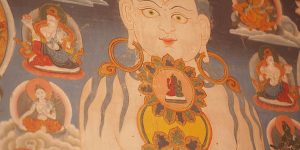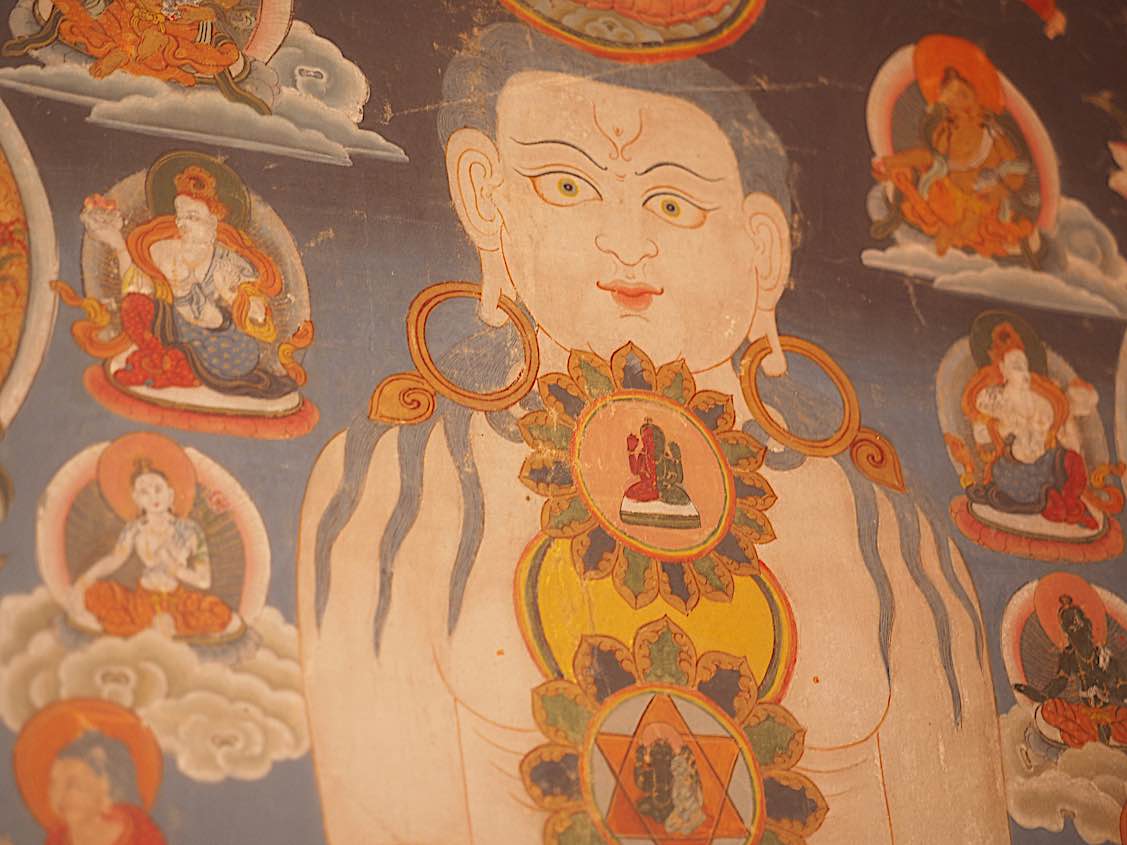“To attain the highest state of bliss, which is Nirvana, we must follow the Blessed One” Kevaddha’s story in Pali Sutta
In Pali sutta there is the wonderful story of Kevaddha, a Braham priest, who longed for “peace of heart and was anxious to reach Nirvana.” Because he could not understand how it was possible in the “flesh” to attain such tranquility, he made it his mission to answer this riddle of Nirvana. He sought the place “where the four states of aggregation, the solid state, the watery state, the fiery state and the state of air, utterly cease?”
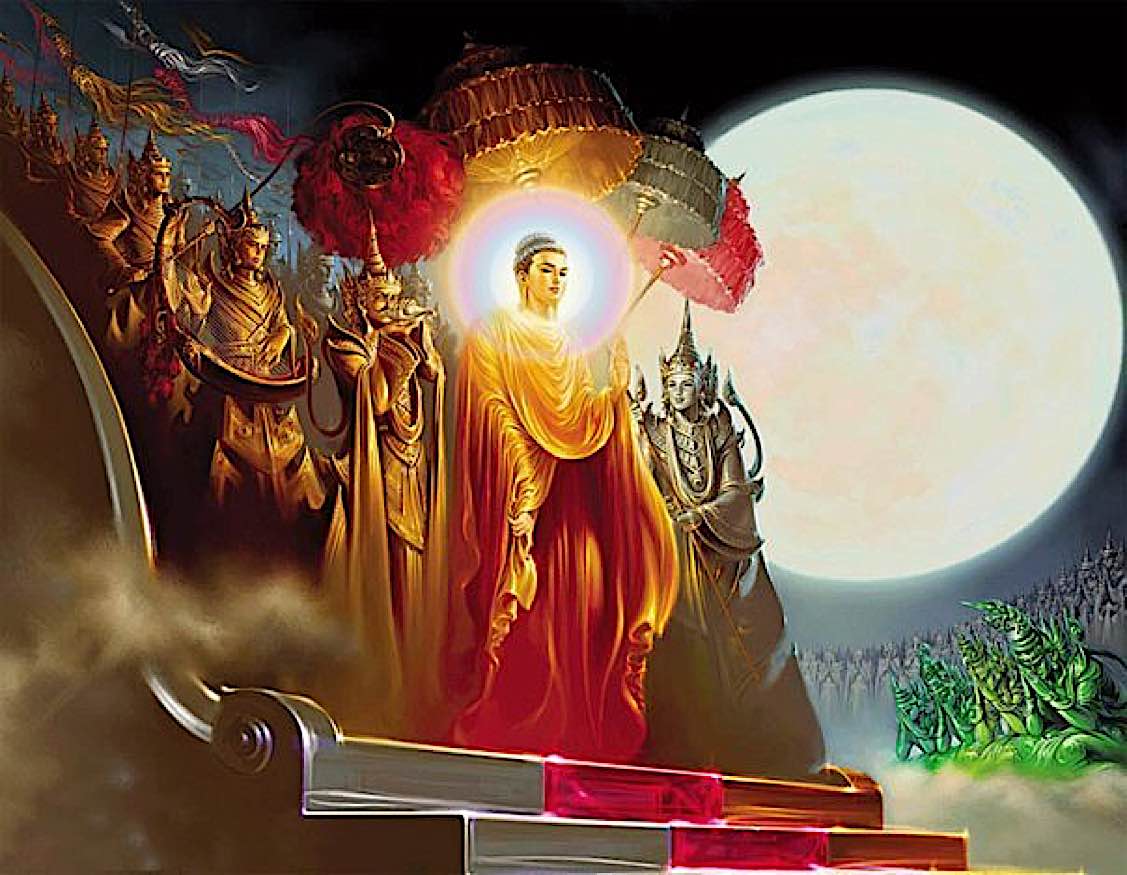
He sought the answers from the deities in heaven: “Having prepared his mind, the priest entered into a trance in which the path to the gods became revealed to him, and he drew near to where the four great kings of the gods were. There, in turn he challenged the four great kings, Ishvara, Yama (death himself), and finally he challenged Brahma [the Supreme Being, Creator] himself with the question. Brahma’s answer only to be sent back to earth to ask the Blessed One, the Enlightened Buddha. A profound teaching on emptiness is wrapped in this wonderful story and dialogue [1], with it’s almost humorous confrontation between a human priest and Brahma. Kevaddha asked:
“Where do the four states of aggregation, the solid state, the watery state, the fiery state, and the state of air, utterly cease?’
When he had thus spoken, the great Brahma opened his mouth and spake as follows: ‘I, O priest, am Brahma, the great Brahma, the Supreme Being, the All-Perfection, the All-Perceiving One, the Controller, the Lord of All, the Creator, the Fashioner, the Chief, the Victor, the Ruler, the All-Father.’
A second time the priest asked his question, and the great Brahma gave him the same answer, saying: ‘I, O priest, am Brahma, the great Brahma, the Supreme Being, the All-Perfection;’ and he did not cease until he had enumerated all the titles applied to him.
Having patiently listened to Brahma, the priest repeated his question a third time, and added: ‘I am not asking you, my friend, Are you Brahma, the great Brahma, the Supreme Being, the All-Perfection, the All-Perceiver, the All-Father, and whatever titles and accomplishments you may have in addition; but this, my friend, is what I ask you: ‘Where do the four states of aggregation, the solid state, the watery state, the fiery state, and the state or air, utterly cease?’
The great Brahma remained unmoved, and answered a third time, saying: ‘I, O priest, am Brahma, the great Brahma, the
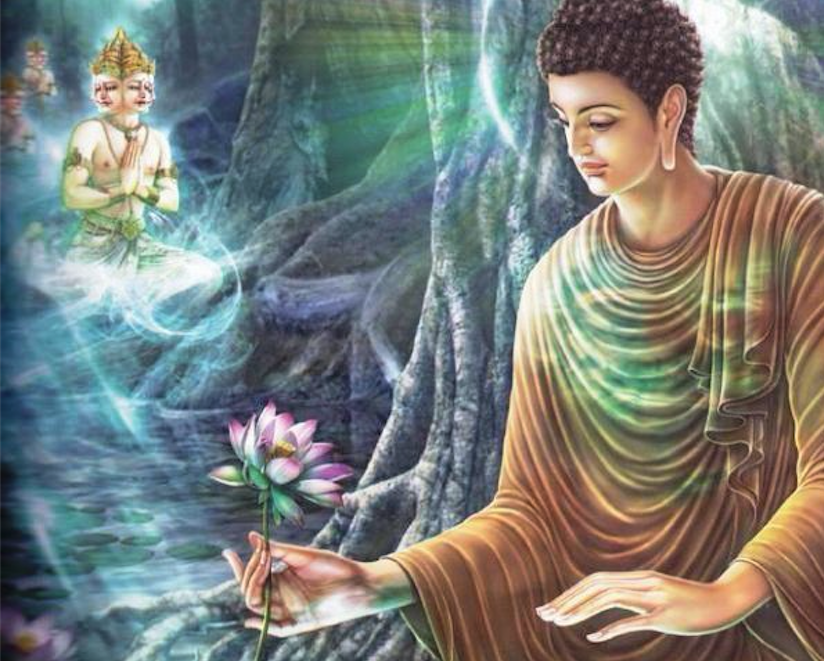
Supreme Being, the All-Perfection, the All-Perceiver,’ enumerating again all the titles applied to him. “Now the priest rose and said: ‘Are you truly a living being, or an automaton, that you can do nothing but repeat a string of words?’
And now the great Brahma rose from his seat and approached the priest, and leading him aside to a place where he could not be overheard by any of the gods, spake to him as follows: ‘The gods of my suite and all the worshipers of the world that honor me with sacrifice and adoration, believe that Brahma sees all things, knows all things, has penetrated all things; therefore, O priest, I answered you as I did in the presence of the gods. But I will tell you, O priest, in confidence, that I do not know where the four states of aggregation, the solid state, the watery state, the fiery state, and the state of air, utterly cease. It was a mistake, O priest, that you left the earth where the Blessed One resides, and came up to heaven in quest of an answer which cannot be given you here. Turn back, O priest, and having drawn near to the Blessed One, the Enlightened Buddha, ask him your question, and as the Blessed One shall explain it to you, so believe.’
Thereupon the priest, as quickly as a strong man might stretch out his bent arm, disappeared from the Brahma heaven and appeared before the Blessed One; and he greeted the Blessed One and sat down respectfully at one side, and spake to the Blessed One as follows: ‘Reverend Sir, where do the four states of aggregation, the solid state, the watery state, the fiery state, and the state of air, utterly cease?’
When he had thus spoken the Blessed One answered as follows: ‘Once upon a time, O priest, some sea-faring traders had a land-sighting bird when they sailed out into the sea; and when the ship was in mid-ocean they set free that land-sighting bird. This bird flies in an easterly direction, in a southerly direction, in a westerly direction, and in a northerly direction, and to the intermediate quarters, and if it sees land anywhere it flies thither, but if it does not see land it returns to the ship. In exactly the same way, O priest, when you had searched as far as the Brahma world and found no answer to your question you returned to the place whence you came. The question, O priest, ought never to have been put thus: Where do these four states of aggregation cease? The question ought to be as follows:
“Oh! Where can water, where can wind, Where fire and earth no footing find? Where disappear all mine and thine, Good, bad, long, short, and coarse and fine, And where do name and form both cease To find in nothingness release?”
The answer, however, is this:
“’Tis in the realm of radiance bright, invisible, eternal light, and infinite, a state of mind, there water, earth, and fire, and wind, and elements of any kind, will nevermore a footing find; there disappear all mine and thine, good, bad, long, short, and coarse, and fine, there too will name and form both cease, to find in nothingness release.”
Then the priest understood that the world of matter is restless and remains restless, but peace of heart is a condition of mind which must be acquired by self-discipline, by wisdom, by devotion. The gods cannot help; nor even can Brahma himself, the Great Brahma, the Supreme Being, the Lord and Creator. Sacrifice is useless and prayer and worship are of no avail.
But if we desire to attain the highest state of bliss, which is Nirvâna, we must follow the Blessed One, the Teacher of gods and men; and like him we must by our own effort become lamps unto ourselves and resolutely walk upon the noble eightfold path.
NOTES
[1] Carus, Paul. Amitabha: A Story of Buddhist Theology (Annotated) (Kindle Locations 269-281). . Kindle Edition. Kevaddha’s story is an abbreviated account of an ancient Buddhist Pali text. The verses as well as other details are almost literally translated. Cf. Henry Warren’s Buddhism in Translations, pp. 308-313.
More articles by this author
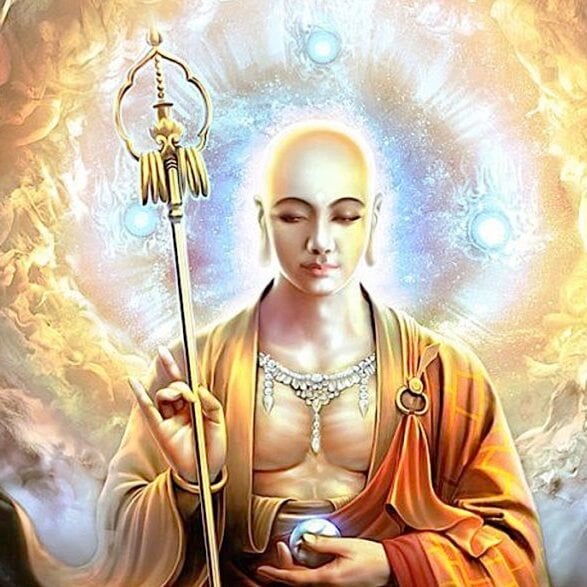
Lama Zopa Rinpoche and other teachers recommend Kṣitigarbha mantra and practice for times of disaster, especially hurricane and earthquake, because of the great Bodhisattva’s vow

Profound simplicity of “Amituofo”: why Nianfo or Nembutsu is a deep, complete practice with innumerable benefits and cannot be dismissed as faith-based: w. full Amitabha Sutra

“Torches That Help Light My Path”: Thich Nhat Hanh’s Translation of the Sutra on the Eight Realizations of the Great Beings

Maha Mangala Sutta, Life’s Highest Blessings, The Sutra on Happiness, the Tathagata’s Teaching to Gods and Men
Search
Latest Features
Please support the "Spread the Dharma" mission as one of our heroic Dharma Supporting Members, or with a one-time donation.
Please Help Support the “Spread the Dharma” Mission!

Be a part of the noble mission as a supporting member or a patron, or a volunteer contributor of content.
The power of Dharma to help sentient beings, in part, lies in ensuring access to Buddha’s precious Dharma — the mission of Buddha Weekly. We can’t do it without you!
A non-profit association since 2007, Buddha Weekly published many feature articles, videos, and, podcasts. Please consider supporting the mission to preserve and “Spread the Dharma." Your support as either a patron or a supporting member helps defray the high costs of producing quality Dharma content. Thank you! Learn more here, or become one of our super karma heroes on Patreon.
Josephine Nolan
Author | Buddha Weekly
Josephine Nolan is an editor and contributing feature writer for several online publications, including EDI Weekly and Buddha Weekly.






